Whether you’ve been trying to conceive or not, it’s totally natural to feel a bit uncertain about what to do after a positive pregnancy test result. Here are some hints and tips from a Flo expert.
-
Tracking cycle
-
Getting pregnant
-
Pregnancy
-
Help Center
-
Flo for Partners
-
Anonymous Mode
-
Flo app reviews
-
Flo Premium New
-
Secret Chats New
-
Symptom Checker New
-
Your cycle
-
Health 360°
-
Getting pregnant
-
Pregnancy
-
Being a mom
-
LGBTQ+
-
Quizzes
-
Ovulation calculator
-
hCG calculator
-
Pregnancy test calculator
-
Menstrual cycle calculator
-
Period calculator
-
Implantation calculator
-
Pregnancy weeks to months calculator
-
Pregnancy due date calculator
-
IVF and FET due date calculator
-
Due date calculator by ultrasound
-
Medical Affairs
-
Science & Research
-
Pass It On Project New
-
Privacy Portal
-
Press Center
-
Flo Accuracy
-
Careers
-
Contact Us
Unsure what to do after a positive pregnancy test? Here’s a checklist


Every piece of content at Flo Health adheres to the highest editorial standards for language, style, and medical accuracy. To learn what we do to deliver the best health and lifestyle insights to you, check out our content review principles.
So, you took a pregnancy test, and the result was positive. Whether this was a long-awaited result or has come as a bit of a surprise, it can feel overwhelming. It’s a massive moment of change, and many of us will either find out by ourselves or with just one other person. It’s understandable if you’re not sure what to do next.
“Pregnancy is a big transition that comes with many changes and huge feelings,” says Dr. Renita White, an obstetrician and gynecologist at Georgia Obstetrics and Gynecology, Georgia, US.
Here’s a checklist of things you can consider after getting a positive pregnancy test result. Remember that while some of the things on this list might resonate with you, we’re all different. So do what feels right for you, and don’t feel pressured into taking steps you aren’t ready for.
Key takeaways
- However you came to do this pregnancy test, it’s totally typical if the result has left you with mixed feelings. It’s a massive life change, after all.
- One thing you can do after getting a positive pregnancy test result is do another test to confirm your result.
- Make an appointment with your doctor to discuss your result as soon as possible. Similarly, you may want to start researching and taking prenatal vitamins. You can get guidance on this from your doctor.
- You might also want to share your news or keep it to yourself for now. Everyone is different, and there is no right or wrong answer.
A checklist of what to do after a positive pregnancy test
1. Think about taking a second pregnancy test
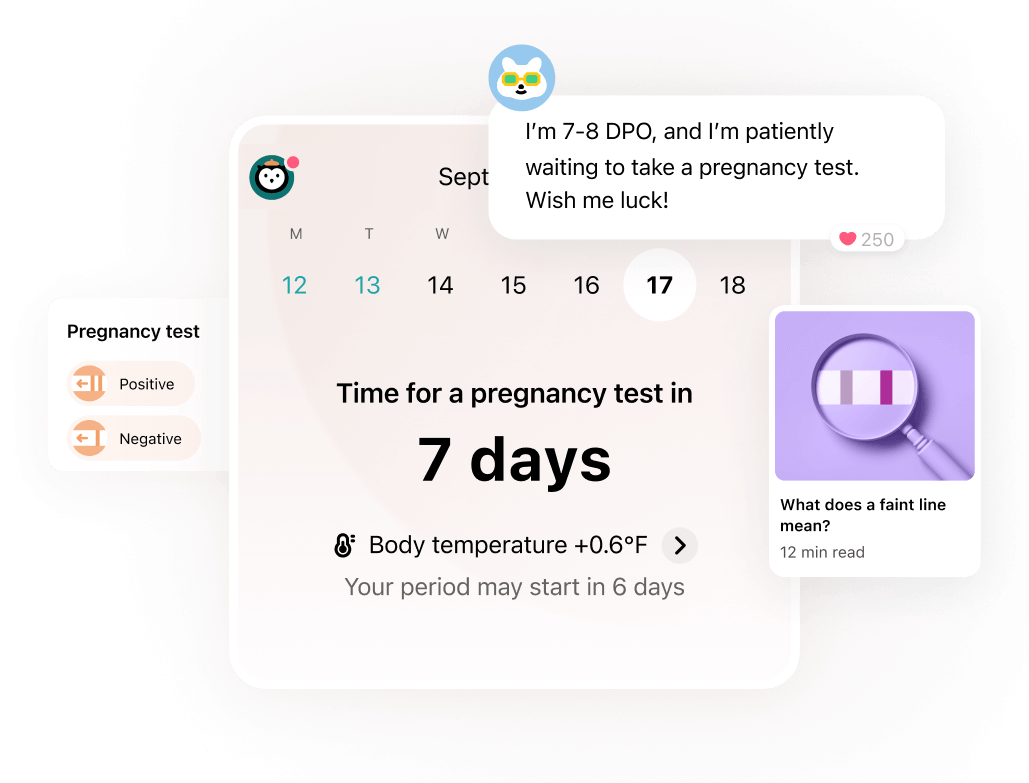
 Over
7.8M
ratings averaging
4.8/5
*
Over
7.8M
ratings averaging
4.8/5
*
Make sense of pregnancy testing with the Flo app
- Know when it’s the right time to take a test.
- Log results of previous pregnancy tests.
- Chat with others who are trying.
 Over
7.8M
ratings averaging
4.8/5
*
Over
7.8M
ratings averaging
4.8/5
*
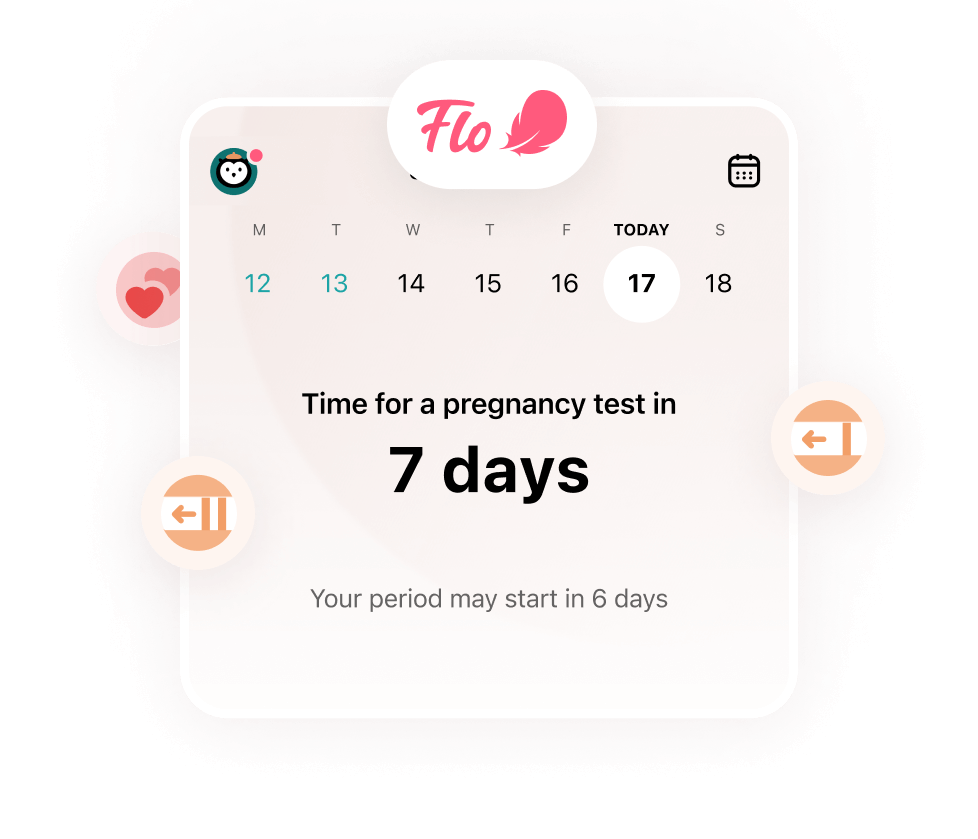
Hoping for a positive pregnancy test?
The Flo app can help you on your path to parenthood.

 Over
7.8M
ratings averaging
4.8/5
*
Over
7.8M
ratings averaging
4.8/5
*
Make sense of pregnancy testing with the Flo app
- Know when it’s the right time to take a test.
- Log results of previous pregnancy tests.
- Chat with others who are trying.
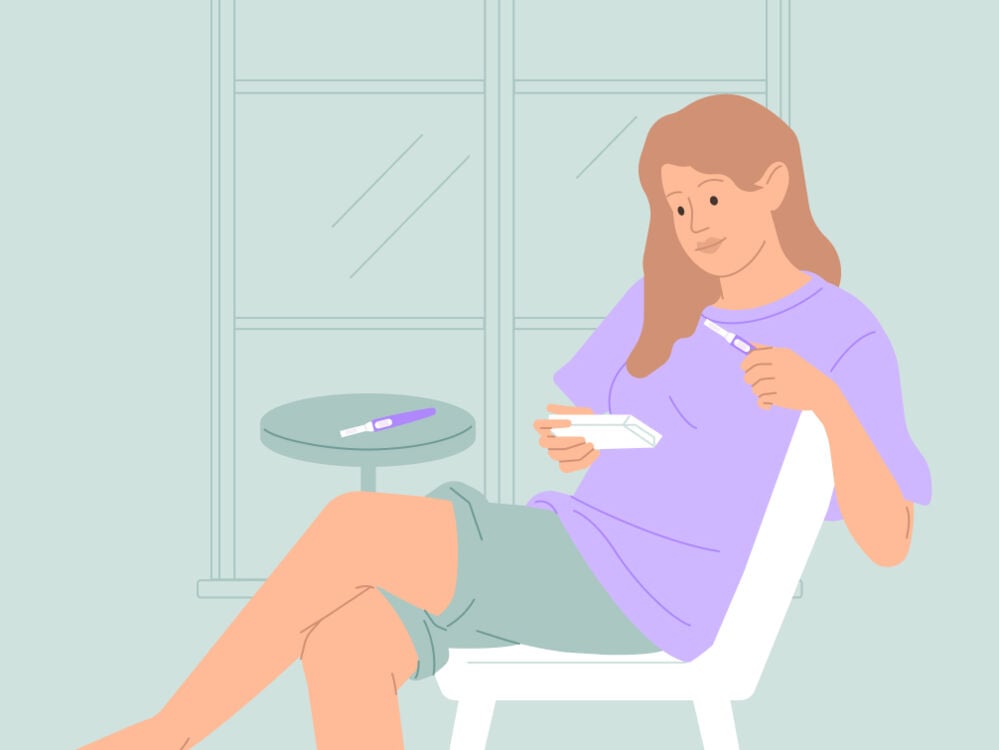
There’s a good reason many pregnancy tests come in boxes of two. If your first test is a clear positive, then you can confirm your result with the second. Pregnancy tests work by detecting the hormone human chorionic gonadotropin (hCG) in your pee. Your body starts to produce hCG after you become pregnant. Your levels rise throughout your 1st trimester, peaking at 10 weeks pregnant.
If you can see a faint line on the pregnancy test or the result is unclear, then take the second test to see if the result appears more clearly. You can also wait a couple of days and then test again. Pregnancy tests become more accurate the longer you wait, so this could give you some clarity.
Take a quiz
Find out what you can do with our Health Assistant
2. Take a moment to reflect
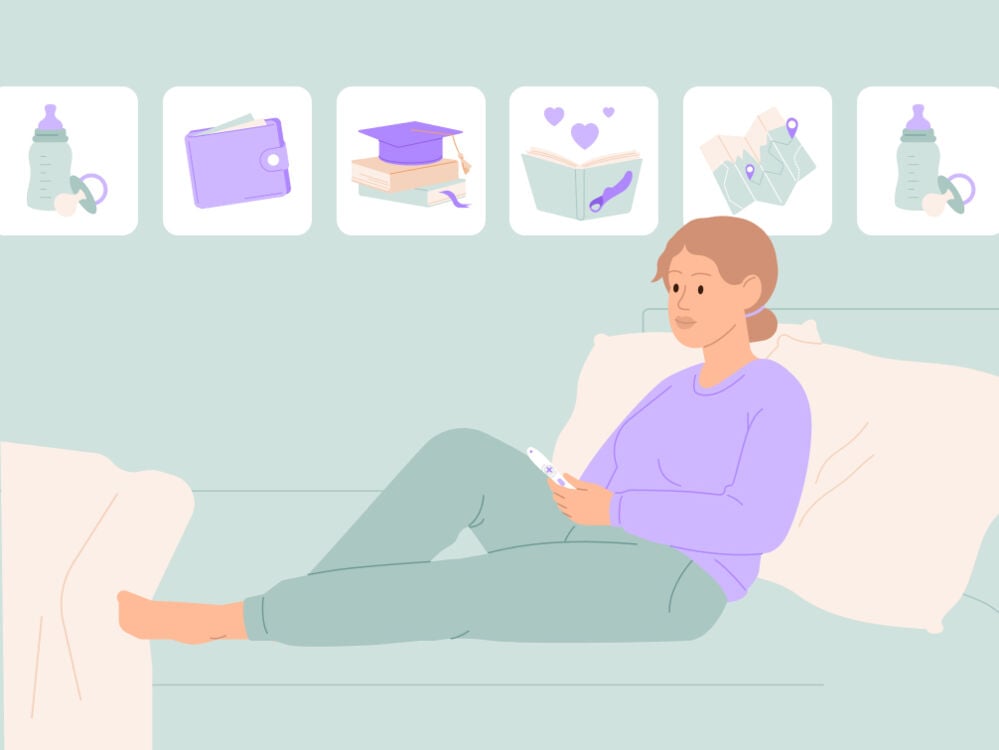
Whether you have been trying for a baby, thought you might be pregnant, or your positive result has come as a bit of a surprise, it’s totally typical to have mixed emotions following a positive result. You might have correctly anticipated how you feel, or you might feel completely differently.
You don’t have to do anything at all after taking a test. In fact, giving yourself some space and time to reflect on how you’re feeling may help you prepare to tell other people, if you want to, and verbalize how you feel.
3. Make an appointment with your doctor
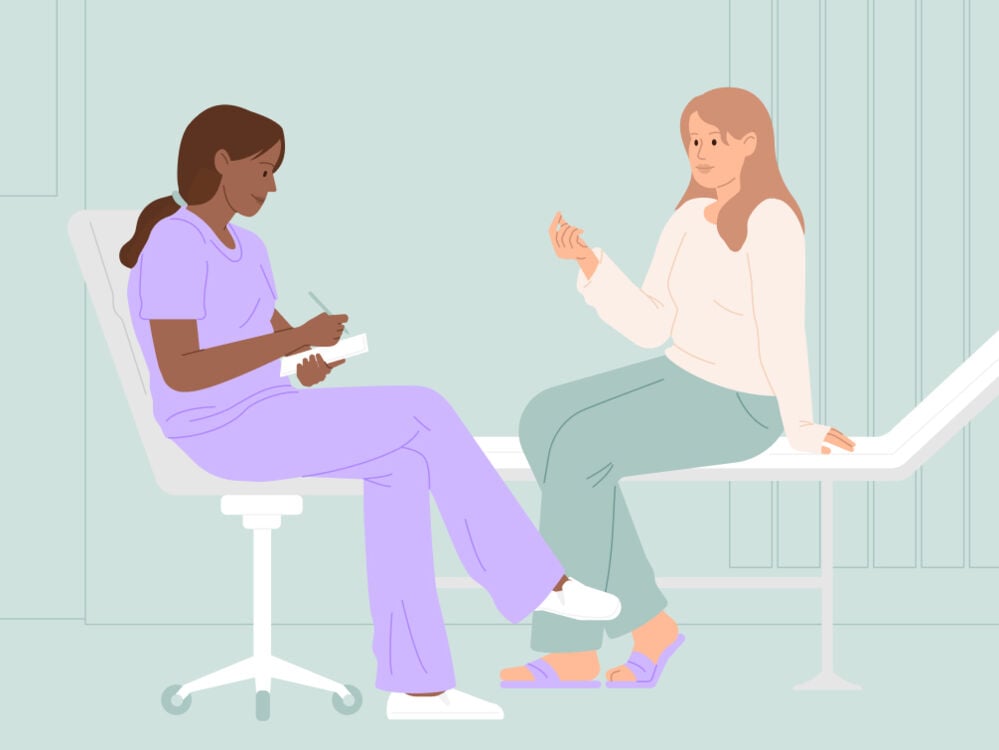
It might feel like early days, but once you’ve had a positive pregnancy test, it’s a good time to call a health care professional for an appointment. They will use this time to confirm that you’re pregnant, check how you’re feeling emotionally and physically, and take a medical history from you.
They might confirm your pregnancy using a blood pregnancy test. They’re much more sensitive, meaning they can pick up lower levels of hCG.
They might also ask you about:
- Your menstrual cycle
- Gynecological history
- Any past pregnancies
- Your health history and your family health history
- Your height and weight
- Any medication you’re taking
- Whether you drink alcohol or smoke
This can feel like they’re delving into some pretty personal details, but all of this information will help them take the best care of you.
4. Learn more about taking care of yourself and your baby during pregnancy

During your first appointment, a health care professional will talk to you about the things you can do to look after yourself. Pregnancy is a massive change, both physically and emotionally — even if you can’t see it right now.
Your doctor may want to discuss a healthy pregnancy diet to ensure that you’re fueling yourself to give you all the energy you need. They may also recommend starting a prenatal vitamin, which includes folic acid, iron, calcium, and vitamin D, right away. You can check out the pregnancy resources in Flo’s health library to learn more about taking care of yourself — and use Flo’s pregnancy-tracking app to understand more about your pregnancy.
5. Consider when you want to share the news with others
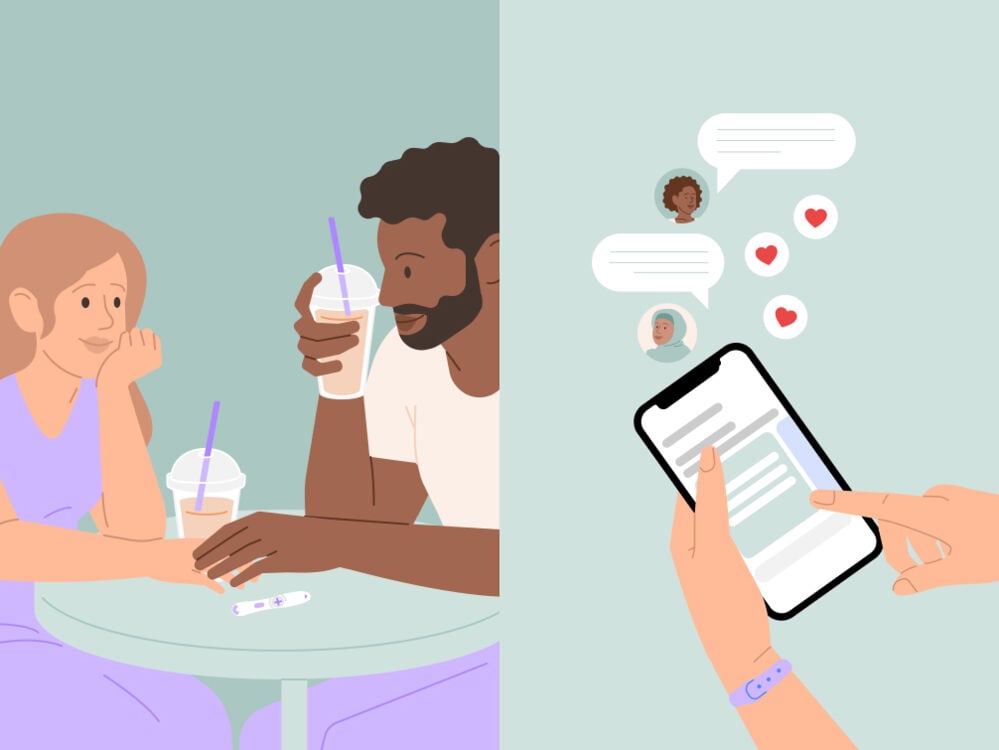
You may not be ready to talk about your pregnancy right away. You might still be processing it yourself. This is totally fine. There are no rules that dictate when to announce a pregnancy. “The perfect time to share the news on your new pregnancy is when you want to share the news,” says Dr. White.
You might have heard that some people choose to wait 12 weeks, or until the end of their 1st trimester, to tell people they’re expecting. Historically, some people have elected to do this as you’re more likely to have a miscarriage during your 1st trimester than at any other time. However, Dr. White explains, “In the unfortunate case of a miscarriage, [sharing] could allow for a network of support of those who already knew about the pregnancy.” Whether it comes from your loved ones, your doctor, or external support, you are never alone after pregnancy loss.
The only thing to remember here is to do what feels right for you.
Early pregnancy comes with its fair share of mystifying signs and symptoms. It can feel really confusing and isolating if you’re experiencing them by yourself. Sometimes, the best way to understand what’s happening to your body is to connect with others going through the same thing.
There are lots of ways to do this. Once you’re a little further along in your pregnancy, you can sign up for a prenatal class in your area. You can talk to others on social media or find a pregnancy-focused exercise class. You can also use Flo’s Secret Chats community. It’s anonymous, so you can talk about the things that matter most to you in absolute privacy.
Taking things step by step after a positive pregnancy test
A positive pregnancy test is a big moment. It can feel like suddenly you are being asked to think about things like giving birth, booking doctor’s appointments, and raising a human.
Don’t rush. In the next few weeks and months, you will discover that there are lots of ways to approach pregnancy. For now, though, take a deep breath and focus on yourself. At the moment, taking good care of yourself is the same as taking good care of your baby — think of it as your first moments of parenting. Opt for healthy food, drink plenty of water, and give yourself a break.
More frequently asked questions about what to do after a positive pregnancy test
How soon after a positive pregnancy test should I see a doctor?
It’s a good idea to make a prenatal care appointment as soon as possible. Your first appointment will usually be before 10 weeks of pregnancy.
What should I do immediately after getting a positive pregnancy test?
“Take a breath and do what feels right for you,” says Dr. White. That could be celebrating, or it could be confiding in someone close to you. If you haven’t already, it’s also worth starting a prenatal vitamin. Choose one that contains folic acid, iron, calcium, and vitamin D. Your doctor will be able to advise you on this.


Hey, I'm Anique
I started using Flo app to track my period and ovulation because we wanted to have a baby.


The Flo app helped me learn about my body and spot ovulation signs during our conception journey.


I vividly
remember the day
that we switched
Flo into
Pregnancy Mode — it was
such a special
moment.
Real stories, real results
Learn how the Flo app became an amazing cheerleader for us on our conception journey.
References
“Human Chorionic Gonadotropin.” Cleveland Clinic, my.clevelandclinic.org/health/articles/22489-human-chorionic-gonadotropin. Accessed 16 Dec. 2024.
“Miscarriage.” Mayo Clinic, 8 Sep. 2023, www.mayoclinic.org/diseases-conditions/pregnancy-loss-miscarriage/symptoms-causes/syc-20354298.
Nichols, Lynn. “The Pros and (Mostly) Cons of Waiting 12 Weeks to Share Pregnancy News.” Stanford Medicine Children’s Health, 4 Oct. 2022, healthier.stanfordchildrens.org/en/the-pros-and-mostly-cons-of-waiting-12-weeks-to-share-pregnancy-news/.
“Nutrition during Pregnancy.” The American College of Obstetricians and Gynecologists, June 2023, www.acog.org/womens-health/faqs/nutrition-during-pregnancy.
“Pregnancy Tests.” Cleveland Clinic, my.clevelandclinic.org/health/diagnostics/9703-pregnancy-tests. Accessed 16 Dec. 2024.
“Prenatal Care: First Trimester Visits.” Mayo Clinic, 26 July 2024, www.mayoclinic.org/healthy-lifestyle/pregnancy-week-by-week/in-depth/prenatal-care/art-20044882.
“Prenatal Vitamins: Why They Matter, How to Choose.” Mayo Clinic, 19 Apr. 2022, www.mayoclinic.org/healthy-lifestyle/pregnancy-week-by-week/in-depth/prenatal-vitamins/art-20046945.
Wilcox, Allen J., et al. “Natural Limits of Pregnancy Testing in Relation to the Expected Menstrual Period.” JAMA, vol. 286, no. 14, Oct. 2001, pp. 1759–61, https://doi.org/10.1001/jama.286.14.1759.
“Your First Prenatal Appointment: What To Expect.” Cleveland Clinic, 20 Dec. 2022, health.clevelandclinic.org/first-prenatal-visit.
History of updates
Current version (10 January 2025)
Published (10 January 2025)
In this article

Get your personal guide to fertility
-
Learn how to read your body's ovulation signals
-
Find daily conception tips from our experts
-
Chat with others who are trying to get pregnant




